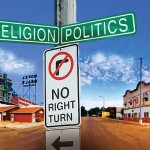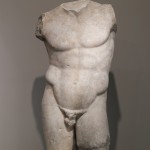The topic in the discussion group at my local UU Church today was prayer. As usual, it was all over the place and hard to follow. On my left was the Buddhist who told about an experience he had praying to a boddisattva that he does not believe in to help him find his way in an unfamiliar city, which was then answered by the sudden and inexplicable appearance of someone he actually knew, in a city of two and a half million people, who knew the way. On the right of me was a self-professed Wiccan girl who kept talking about God in very transcendental theistic, even Christian, and noticeably masculine terms. Then there was the New Age lady who was all about putting good “energy” or “vibrations” out into the universe in the hopes the same would reciprocate. Naturally, she invoked quantum physics like some mental talisman that obviates the need for rational thought. Then there was the atheist who came back to the fact that belief in a personal god who hears and answers some prayers and not others creates all kinds of unresolvable logic problems.
I actually shared my own experience recently of praying to the Goddess in a conversational way. And how I wanted to receive an answer in the form of a prayer, and how I actually had an incredible dream a week or so later. After church, a friend from the group came up to me and shared a personal experience she had where she felt she had received an answer to a prayer. I have had these kind of experiences myself, like hers and like that described by the Buddhist above. I have had them in “response” to prayer and I have had them without prayer. I can’t explain it, and I really don’t want to try.
At some point in these discussions, though, my mind inevitably comes around to the problem of human suffering. I told my fellow parishioners what I have told my father once in the past when we were talking about God answering prayers: I hope its not true. Because if there is a God sitting “up there” somewhere, listening to prayers and answering some and not others, or waiting for someone to pray before interceding in human suffering, then I will be really pissed at that God. I think the notion is horrible, even terrifying. Of course, I don’t believe in that kind of God, but there were people in that room who did and left feeling angry, angry at this God that I don’t believe in.
I spent two years in northeast Brazil, which is considered the backward part of that country and I saw the human spirit crushed by poverty and ignorance. I saw children barefoot and playing garbage who would likely never rise above it. And I will not believe that there is any redemption for it.
In her book Memnoch, the Devil, Anne Rice describes a conversation between the Devil and God about human suffering. In the book, God believes human suffering is redemptive, and he describes his intent to become human and be sacrificed in order to sanctify suffering. The Devil responds with horror. God asks, “Don’t you understand the magnificence in human suffering?” “No,” the Devil answers,
“I see the ruin of hope and love and family; the destruction of peace of mind; I see pain beyond endurance; I see man buckle under this, and fall into bitterness and hate. … Their souls come to Sheol distorted, twisted by pain, black as cinders from the heat of loss and misery and violence which they have witnessed. Suffering is evil in this world.”
Later, the Devil explains to the protagonist of the novel: “What about the souls who shrink in bitterness, who never flower as the heels of warriors walk over them, what about the souls warped and twisted by unspeakable injustice, who go into eternity cursing?” He goes on, “People in your modern world of the late twentieth century have never stopped believing in Him [God]. It’s that they hate Him; they resent him; they are furious with Him. They feel … superior to Him.” Is my anger an indication that I have not stopped believing in that kind of God, that I believe in him but feel superior to him?
Rice’s Devil argues that suffering was never necessary, that all human beings need in order to reach heaven is to feel love, love in the arms of a mate or love for a child, and have an eye for beauty. God responds, “What you learnt of life, you learnt in bed.” And the Devil answers: “That’s true. And suffering is so terrible for humans, injustice so terrible for the balance of their minds that they destroy those lessons learnt in bed, magnificent as they are!”
The Christian in our UU group responded to me that if there was no suffering, we would not know joy, and the Buddhist was nodding along side of him. That’s all well and good for us to talk about the value of human suffering, sitting in our air conditioned homes in what by world standards would be considered very comfortable situations. I understand the value of the suffering I have experienced in my life. But those children in Brazil, they will never know the other side of the equation; they will only know the suffering.
Do they know what they are missing? Hunger is hunger, I think. And cold is cold. Whether you have ever known the opposite or not. And many of them do have television, which they watch on their dirt floors in their hovels, so they do know there is something better. And even if they don’t, I know. I know that that is a human being there playing in the garbage, and that if given the right nutrition and education and love that child could be a great artist or scientist or a wonderful parent.
There is no redemption for that. My joy does not redeem it. And the small miracles in my life do not redeem it. One of my favorite books is Solaris by Stanislav Lem (made into a Russian film and later remade into a movie with George Clooney). In it, the characters experience what can only be described as a miracle, but it is a miracle that is inscrutable, its meaning or purpose unknowable. In fact, some of the characters react with horror and violence to the miracle. Lev calls these events “cruel miracles”. That is how I feel about God’s answers to our petty prayers, they are cruel miracles.
I will not, like the atheist, deny the reality of the miraculous even though I cannot explain it. But neither will I, like the Christian, allow the miraculous to redeem human suffering in my mind. I must hold these two truths in tension: there is something that responds to us in the universe, to our need, to our hopes; but it cannot be counted on; and there are some whose lives will pass away without knowing its influence at all, while others are inexplicably blessed with an abundance of cruel miracles.
Annie Dillard writes:
“I don’t know what it is about fecundity that so appalls. I suppose it is the teeming evidence that birth and growth, which we value, are ubiquitous and blind, that life itself is so astonishingly cheap, that nature is as careless as it is bountiful, and that with extravagance goes a crushing waste that will one day include our own cheap lives.”
I think about those children in Brazil, and they seem like so many seeds scattered carelessly on rocky ground. (See Gospel of Mark 4:3-8.) And this is my Goddess, I must admit, even more than the Christian God. As Dillard writes, she is as careless as she is bountiful. But Dillard finds beauty amongst the pain and waste, beauty which does not redeem, but is there nonetheless:
“Cruelty is a mystery, and the waste of pain. But if we describe the world to compass these things, a world that is a long, brute game, then we bump up against another mystery: in inrush of power and light, the canary that sings on the skull. Unless all ages and races of men have been deluded by the same mass hypnotist (who?), there seems to be such a thing as beauty, a grace wholly gratuitous.”
This beauty, she says, is like the old philosophical conundrum about the tree that falls in the forest. “The answer must be,” she writes, “that beauty and grace are performed whether or not we will or sense them. The least we can do is try to be there.”
My Pagan practice is about “trying to be there” to experience the beauty and grace that will be performed whether I am there to see it or not. But, as a humanist, I remind myself that I cannot let these moments of beauty and grace make me forget the other people in the room — the very real human beings that I share this planet with. We may only be a part of an inordinate fecundity to the Goddess, but to one another we must be more.











